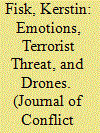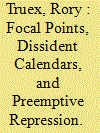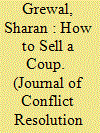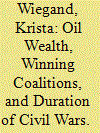|
|
|
Sort Order |
|
|
|
Items / Page
|
|
|
|
|
|
|
| Srl | Item |
| 1 |
ID:
165262


|
|
|
|
|
| Summary/Abstract |
In this article, we investigate how threat perceptions and emotions can jointly impact individuals’ attitudes toward drone strikes. We argue that conditions of threat can increase public support for the use of drone strikes. We further contend that the effect of threat perceptions on support for drone strikes is mediated by negative, emotional reactions, particularly anger. We test our arguments in France, the United States, and Turkey using data generated from nationally representative online surveys, in which individuals were randomly assigned to a control group, a condition in which they read about terrorist threat (with or without a reminder of democratic values), or a condition in which they read about economic threats. Our findings have implications for long-standing notions about the roles of rational calculations and psychological processes in influencing support for aggressive foreign policy.
|
|
|
|
|
|
|
|
|
|
|
|
|
|
|
|
| 2 |
ID:
165258


|
|
|
|
|
| Summary/Abstract |
Theories of crisis bargaining suggest that military mobilizations act as costly signals of resolve, increasing the credibility of coercive threats. In this article, I argue that air mobilizations, as a subset of military signals, demonstrate a lack of resolve during coercive bargaining for four reasons: they cost less in terms of human and financial resources (sunk costs), generate lower political costs (hand-tying), do not raise the risks of engagement (manipulation of risk), and do not significantly shift the balance of power—all compared with other military signals. Using new data that disaggregates military demonstrations into air, naval, and land signals during 210 cases of compellence, this article presents systematic evidence that air signals decrease the probability of coercive threat success compared with the alternatives. This finding holds important implications for theoretical and policy debates regarding the role of costly signals in international bargaining.
|
|
|
|
|
|
|
|
|
|
|
|
|
|
|
|
| 3 |
ID:
165264


|
|
|
|
|
| Summary/Abstract |
This article explains temporal variation in repression as a function of the “dissident calendar,” the set of events that serve as natural focal points for coordination. The core argument is that regimes can anticipate the events that create these focal points and engage in preemptive repression to survive their passing. This dynamic produces predictable, often cyclical patterns in repression. An analysis of dissident detentions in China from 1998 to 2014 shows that “focal events” alone appear to be responsible for more than 20 percent of dissident detentions over the analysis period. Such detentions tend to be shorter and rely less on formal criminal procedures, suggesting a “catch-and-release” dynamic. Additional analysis of detentions in Tibet shows how the calendar may vary by issue or group.
|
|
|
|
|
|
|
|
|
|
|
|
|
|
|
|
| 4 |
ID:
165260


|
|
|
|
|
| Summary/Abstract |
How can declining states reliably infer the intentions of rising states? One prominent line of argument maintains that because declining states face intractable uncertainty about rising states’ future intentions, preventive war is often unavoidable even between states with truly compatible goals. This article presents a dynamic model of reassurance in which actors are uncertain whether or not their interests conflict. The model shows that by adopting a hedging strategy of limited containment short of war, declining states can reduce risers’ incentives to send dishonest cooperative signals. This, in turn, makes cooperation more credible as a signal of risers’ benign intentions. Moreover, these signals are sufficiently informative to dissuade the decliner from escalating to preventive war even under large power shifts. Thus, although power shifts promote limited competition among states with compatible goals, preventive war rationally occurs only in a bargaining context when the riser’s goals are known to be incompatible.
|
|
|
|
|
|
|
|
|
|
|
|
|
|
|
|
| 5 |
ID:
165263


|
|
|
|
|
| Summary/Abstract |
Unlike other political leaders, leaders coming to power through military coups face a dual legitimation challenge: they must justify not only why they should rule but also how they came to power. Little attention has been paid to how coup leaders solve this legitimacy deficit and even less to the audiences of this legitimation. We ask: why do some coup leaders legitimate their coups by holding elections while others do not? Counterintuitively, we argue that coup leaders who oust democratically elected leaders are less likely to hold elections, except when tied to US military aid. We test these hypotheses through a data set of military coup regimes from 1946 to 2014 and trace out mechanisms through case studies of the Nigerian coup of 1983 and the Egyptian coup of 2013. This argument provides a new explanation for the emergence of authoritarian elections and a new perspective on the international dimensions of dictatorship.
|
|
|
|
|
|
|
|
|
|
|
|
|
|
|
|
| 6 |
ID:
165261


|
|
|
|
|
| Summary/Abstract |
Are leaders from certain parties particularly likely to engage in military conflict? This question is difficult to answer because of selection bias. For example, countries may be more likely to elect right-wing leaders if their publics are more hawkish or if the international system is particularly dangerous. Put simply, who comes to power is not random, which makes causal inference difficult. We overcome this problem by using a regression discontinuity design. Specifically, we look at close presidential elections that were essentially “tossups” between two candidates. We find that electing right-wing candidates increases state aggression. We also find that electing candidates from challenger parties makes countries much more likely to initiate military disputes, particularly in the first year of the new leader’s term. This result is consistent with other studies that find that the likelihood of state aggression increases following major leadership transitions.
|
|
|
|
|
|
|
|
|
|
|
|
|
|
|
|
| 7 |
ID:
165266


|
|
|
|
|
| Summary/Abstract |
New research has begun to underscore the complicated relationship between democratic institutions and the duration of civil wars. Specifically, greater constraints placed on executives often lead to considerably longer civil wars as leaders are limited in how they bargain with dissidents. This presents a puzzle as democracies are often seen as credible negotiators in international disputes. This article suggests that the size of the government’s winning coalition represents a double-edged sword. Larger winning coalitions allow governments to bargain more credibly but also place constraints on what governments can offer since peace agreements may alienate coalition members. Fortunately, future access to postwar oil wealth provides the feasibility for the governments to compensate hard-liners who may lose out on any settlement, making them more likely to allow concessions to rebels. This combined credibility of large winning coalitions and the feasibility provided by oil wealth allows for peace agreements, therefore shortening the duration of civil wars. We test these propositions by examining the conditional relationship between oil wealth and coalition size on the duration of all civil wars between 1950 and 2009.
|
|
|
|
|
|
|
|
|
|
|
|
|
|
|
|
| 8 |
ID:
165257


|
|
|
|
|
| Summary/Abstract |
What are the effects of partisan electoral interventions on the subsequent character of the regime in the targeted country? Partisan electoral interventions have been frequently used by the great powers ever since the rise of meaningful competitive elections around the world. Such interventions have been found to have significant effects on the results of the intervened elections determining in many cases the identity of the winner. Nevertheless, there has been little research on the effects of partisan electoral interventions on the target’s subsequent level of democracy. This study investigates this question, testing three hypotheses derived from relevant political science literatures. I find suggestive evidence that covert electoral interventions have a significant negative effect on the target’s democracy increasing its susceptibility to a democratic breakdown. I also find preliminary evidence that the identity of the intervener has a mediating effect on the negative effects of covert interventions.
|
|
|
|
|
|
|
|
|
|
|
|
|
|
|
|
| 9 |
ID:
165259


|
|
|
|
|
| Summary/Abstract |
What does international hierarchy look like? The emerging literatures on hierarchy and international orders remain overwhelmingly focused on the contemporary era and on the great powers that comprise the top of the hierarchy. This article addresses that gap by examining diplomacy, war, and domestic politics in the premodern Vietnam–China relationship under the hierarchic tributary system. Specifically, we construct a unique data set of over 1,200 entries, which measures wars and other violence in the region from 1365 to 1789. The data revealed the stable and legitimate nature of tributary relations between formally unequal political units. The Vietnamese court explicitly recognized its unequal status in its relations with China through a number of institutions and norms. Vietnamese rulers also displayed very little military attention to their relations with China. Rather, Vietnamese leaders were clearly more concerned with quelling chronic domestic instability and managing relations with kingdoms to their south and west.
|
|
|
|
|
|
|
|
|
|
|
|
|
|
|
|
| 10 |
ID:
165265


|
|
|
|
|
| Summary/Abstract |
Life on the frontlines of a civil war is markedly different from life in safe(r) areas. How does this drastic difference in lived experience shape civilian attitudes toward war and peace? Contrary to theories that link conflict exposure to intransigence, I argue that under certain conditions, exposure increases support for both peace as an outcome and the granting of concessions to armed actors who render settlement more likely. I use various model specifications and matching methodology on survey data from the Colombian peace process, finding strong evidence that civilians in conflict zones exhibit greater support for the peace process overall and are more willing to grant political concessions to armed groups. Mixed evidence further suggests that exposed civilians are less willing to reintegrate with demobilized fighters. The study has theoretical implications for accounts of conflict exposure and helps explain regional variation in the failed referendum vote in Colombia.
|
|
|
|
|
|
|
|
|
|
|
|
|
|
|
|
|
|
|
|
|